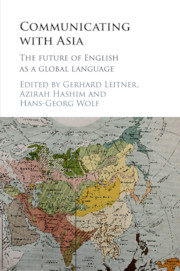Book contents
- Communicating with Asia
- Communicating with Asia
- Copyright page
- Contents
- Figures
- Tables
- Contributors
- Book part
- Communicating with Asia: introduction
- Part I English in selected regional and national habitats with a glance at the role of outward-bound communication needs
- Part II Major other languages in Asia, their international status and impact on education
- Part III Wider perspectives
- Bibliography
- Index
Part I - English in selected regional and national habitats with a glance at the role of outward-bound communication needs
Published online by Cambridge University Press: 05 January 2016
- Communicating with Asia
- Communicating with Asia
- Copyright page
- Contents
- Figures
- Tables
- Contributors
- Book part
- Communicating with Asia: introduction
- Part I English in selected regional and national habitats with a glance at the role of outward-bound communication needs
- Part II Major other languages in Asia, their international status and impact on education
- Part III Wider perspectives
- Bibliography
- Index
Summary
This chapter traces the history of the privileged role of English in the domains of power in Pakistan. English entered these domains and became a marker of the elite culture in South Asia. Its presence in the education sector, which is the supplier of people skilled in English to all other domains, is given special attention. As English became a second language, it became a non-native variety in its own right as it did in African and other Asian countries. This variety is called Pakistani English (PakE) and some aspects of it are described synoptically. Moreover, the way English is used informally, and sometimes even in formal written discourses, involves the use of expressions from indigenous languages. Code-switching is regarded as a form of linguistic corruption or incompetence by some, but, among other things, is a device for signalling power-relations or class. It may serve the function of crossing into the desiderated class of fluent English speakers. In order to illustrate that code-switching is not English-induced, samples of it in Persian and Urdu from the Medieval Period will be provided; they show that code-switching is not a corruption of English but is both local and recognized in high literature. By presenting historical and sociolinguistic background, this chapter will provide a more holistic understanding of the interaction of English with the history of South Asia in general and that of Pakistan in particular.
- Type
- Chapter
- Information
- Communicating with AsiaThe Future of English as a Global Language, pp. 11 - 152Publisher: Cambridge University PressPrint publication year: 2016

